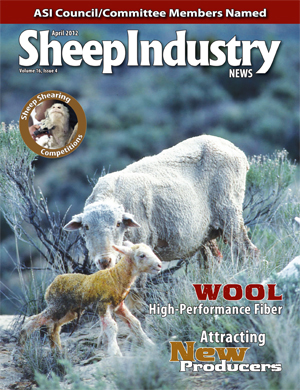Guard Dog Program Emphasizes Bonding
CHRISTY MARTINEZ
Reprinted from the Wyoming Livestock Roundup
(April 1, 2012) What began as a matter of necessity for sheep producer Marv Dunster of Billings, Mont., has now turned into a business raising and producing guard dogs for different settings and situations across the country.
“We moved to Montana, and when the sheep came off the truck they were wet and smelly, and within the first 24 hours we had an attack from neighboring dogs,” says Dunster. “Consequently, we ended up getting a female guard dog.”
Following that, he added a stud dog and started raising a litter of pups every year, and now 5R Stock Dogs is busy year round, whelping and placing dogs with livestock producers around the country.
“We were selling six to eight pups each year, and now we produce over 100 guard dogs every year,” he notes.
Although Dunster started with Great Pyrenees, he soon added Akbash dogs, after wolves were reintroduced to Wyoming, Montana and Idaho.
“Great Pyrenees are the least aggressive, but they have long hair that’s high maintenance, so we started crossbreeding them with the Akbash, which gave us the disposition of the Pyrenees with the athleticism, aggressiveness, short hair and large size of the Akbash,” he explains.
The third breed added to 5R Stock Dogs was the Anatolian shepherd.
“A genuine Anatolian is a very short-haired dog and they look a lot like a Great Dane with a fawn color and black muzzle,” says Dunster.
In addition to purebreds, Dunster says he crossed them back with his Akbash and then with his Great Pyrenees, which he says resulted in a dog with short hair and athleticism.
“The people in Oregon and Washington love the Anatolian shepherd,” he says. “That breed is what they had to begin with, and they’re happy with it.”
In addition to those states, Dunster says he places dogs in Utah, Colorado, North Dakota, South Dakota, Nebraska, Iowa, Montana, Wyoming, Idaho and California.
Around six years ago a fourth breed was added to the stock dog operation – the Komondor, which comes from Hungary.
“Mary people don’t like their long, matted hair, so we started out breeding half Akbash, half Komondor dogs,” says Dunster. “We felt like when we got down to a quarter or an eighth Komodor we had our best dog – the hair was a little wiry, not long and matted, and the dogs had good dispositions. They’re aggressive and big, but we also found, in our program, that they’re some of the best maternal dogs we’ve ever had.”
The most recent addition to 5R Stock Dogs is the Marema breed, which hails from Italy.
Of the placements for their dogs, Dunster says he offers a one-year health certificate on every dog he sells, and he guarantees all of them to be bonded with livestock.
“We follow up with producers, talking to them five times the first year they own one of our dogs,” he says. “That’s how we know what dogs are doing best in certain situations.
Placement is very important in how these dogs get started out – if we have a good placement, rarely do we have an issue.
“The number one trait we breed for in our program is disposition, because there are federal lands involved in allotments, and we don’t want joggers or children to be interfered with,” says Dunster.
Dunster says guard dogs can be good tools for anyone who has sheep and has losses to predators. He says that 90 percent or more of his placements are for producers who have issues with coyotes, while other dogs are aimed to prevent fox, black bear and mountain lion predation.
“We don’t expect these dogs to fight off a grizzly or wolf – I believe they’re more of a neutralizing agent,” says Dunster. “Their presence will keep the honest predators away.”
“The honest predator will be on your property and won’t give you any livestock loss,” he explains. “There are many coyotes that live amongst the sheep and don’t kill sheep – they eat mice, rabbits and birds. The dishonest predator will come in and start taking a toll on your population.”
“When you know you have a dishonest predator, 99 percent of producers will call in a trapper to destroy that animal or animals, and then you’re back to square one, dealing with honest predators,” he continues. “It’s cyclical, and you have to help these dogs with the dishonest predators.”
“If you have two dogs on your sheep and you aren’t losing any lambs to coyotes, and you wake up one morning and see a coyote and shoot it, I have to assume you’ve shot an honest predator,” notes Dunster. “When you take an honest predator out of your system, you leave a vacancy and you don’t know what the next coyote will be like.”
For a livestock producer who is looking at adding a guard dog to his management tools, Dunster says the time to introduce one is when you start thinking about it.
“The most difficult time for placement is right after a predator attack,” he says.
Dunster says he’s proud of his dogs, because he has worked to develop a program with a wide variety of dogs that will fit a wide variety of settings. He says he’s especially pleased with how well bonded his dogs are to livestock.
“We don’t train these dogs, we bond them,” he says.
For more information on 5R Stock Dogs, call 406-670-3575.


